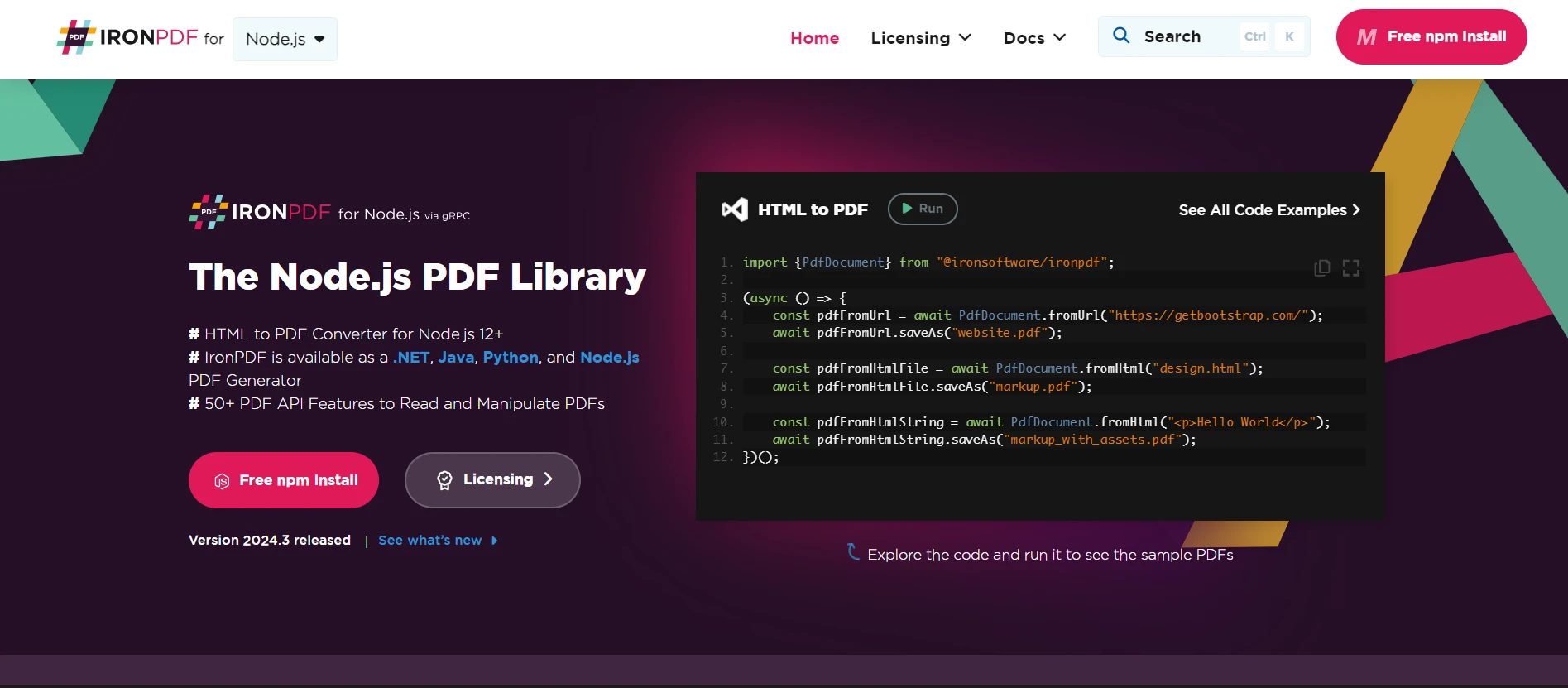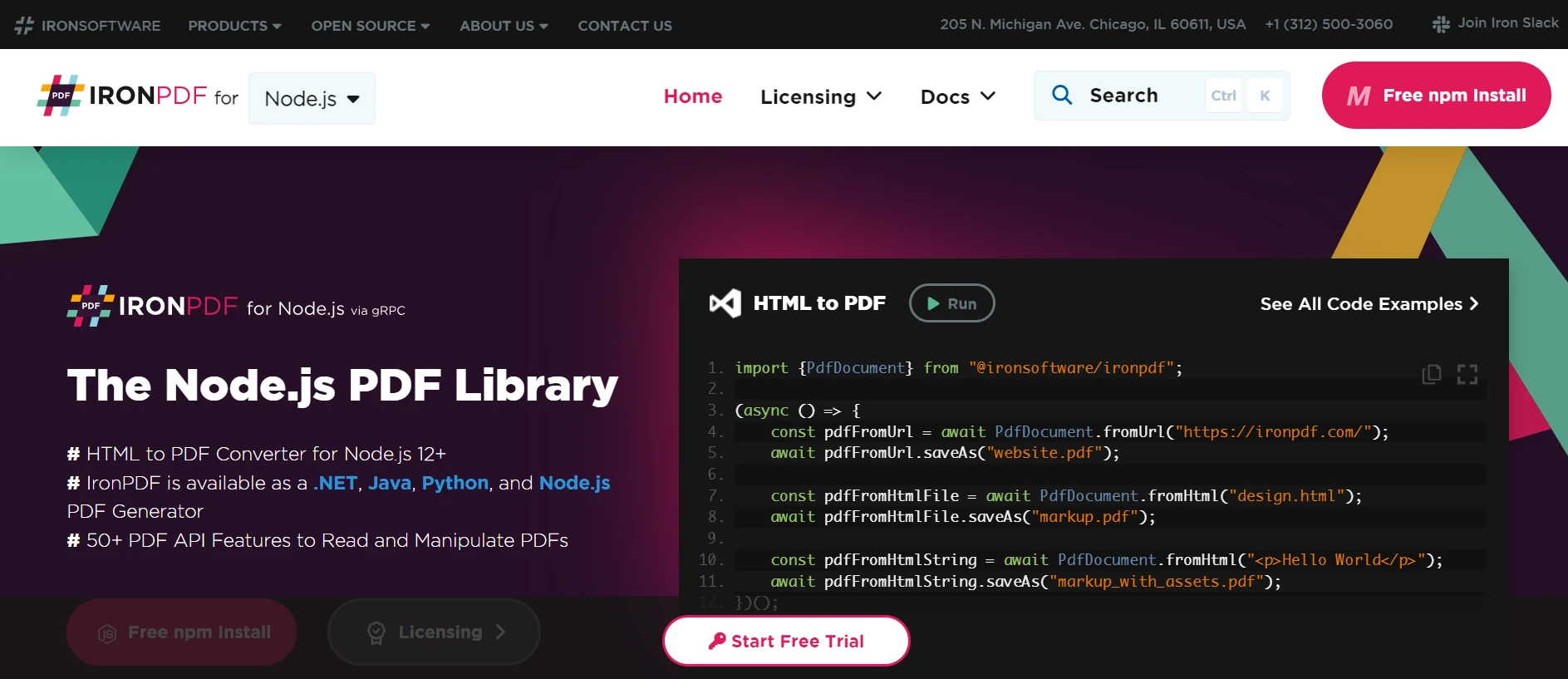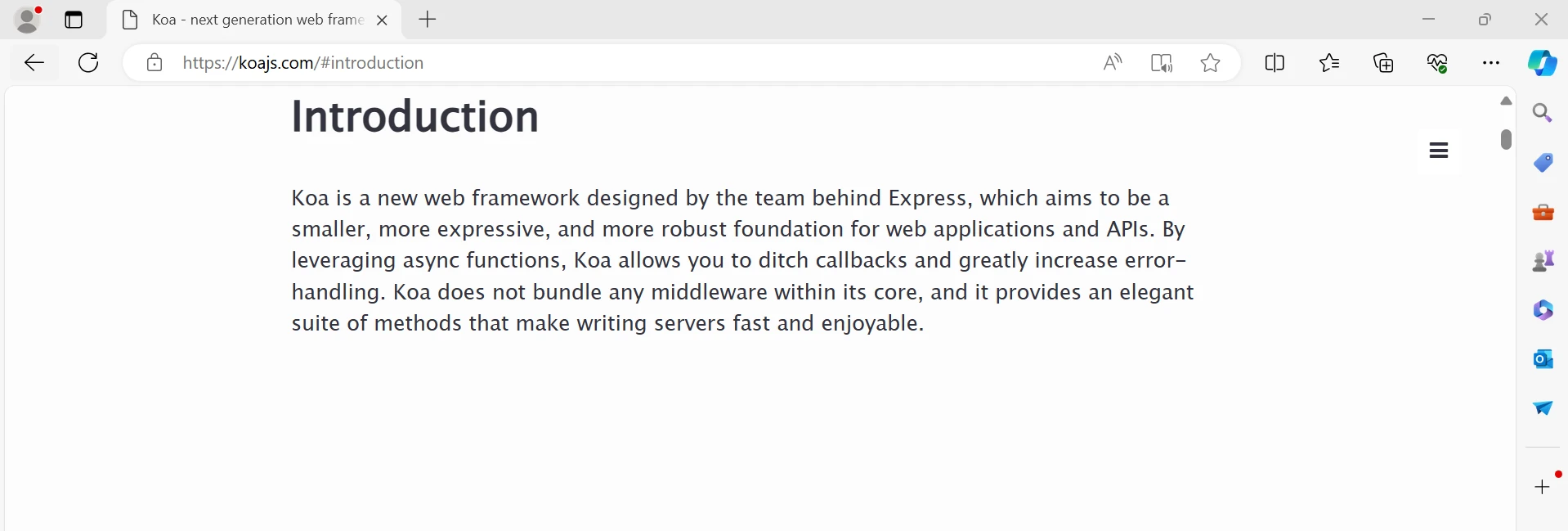fs extra npm (How It Works For Developers)
Node.js is a robust JavaScript runtime that has transformed server-side programming by providing an effective and scalable application development environment. Among the many Node.js packages available to developers, fs-extra and IronPDF stand out for their sophisticated file handling and PDF creation capabilities.
fs-extra is an enhanced version of Node's native fs module. It offers a more user-friendly API and additional methods for file operations like copying, moving, and deleting. Asynchronous programming is made easier with promise support, ensuring smooth file system management and streamlining the handling of JSON files.
Conversely, IronPDF is a powerful PDF library that lets programmers generate, modify, and extract content from PDF files. It is useful for creating PDF documents from HTML or unformatted text, combining several PDFs, and adding headers, footers, watermarks, and other customizations to PDFs. This makes it a valuable tool for creating invoices, reports, and other documents on the fly.
By integrating fs-extra and IronPDF, developers can create complex file management systems and produce professional-quality PDFs within their Node.js applications. This combination guarantees that programs can effectively handle complicated file and document processing tasks while increasing productivity.
What is fs-extra npm?
The fs-extra package is a flexible Node.js utility that extends the built-in fs (file system) module by providing more features to simplify routine file operations. It offers functions like fs.copy, fs.move, and fs.remove to make tasks such as copying, moving, and deleting files and directories easier. Additionally, fs-extra comes with tools for reading and writing JSON files (fs.readJson, fs.writeJson), checking the existence of directories or files (fs.ensureDir, fs.ensureFile), and performing other handy operations. It supports Promises, allowing for the use of async/await syntax to manage asynchronous programming more comfortably. All fs methods return promises, and fs-extra also includes synchronous methods.
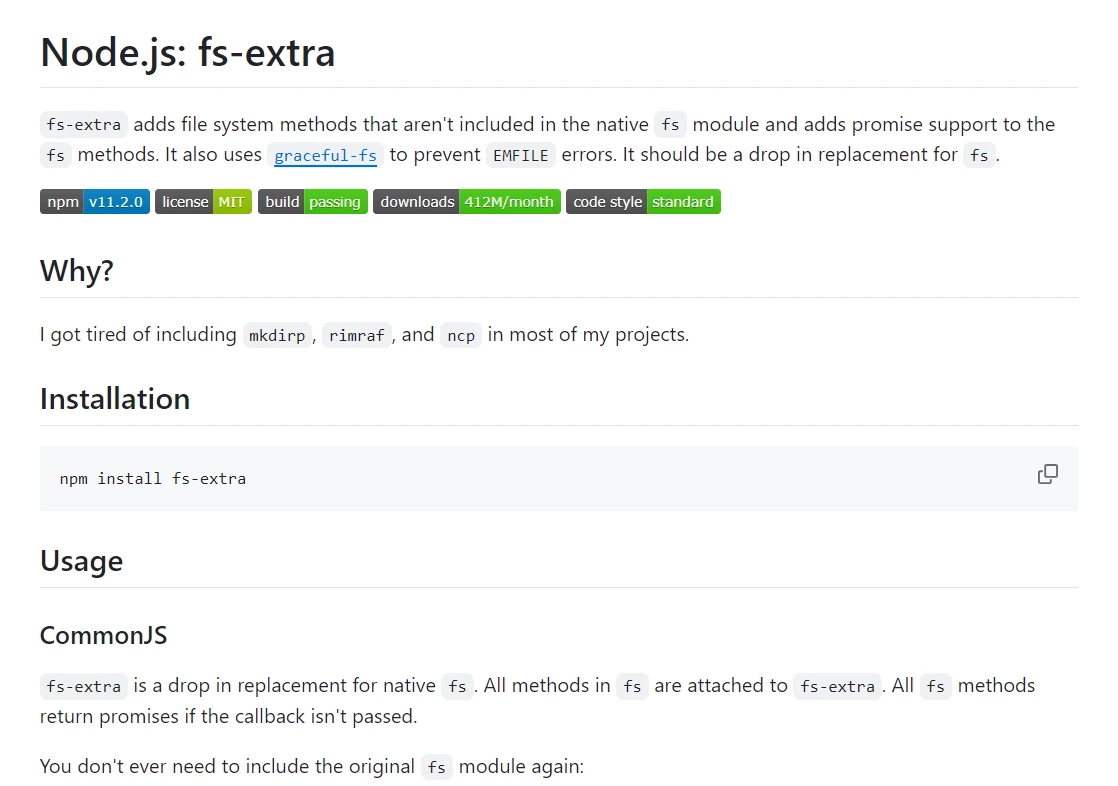
Features of fs-extra
Expanding on the features of the native fs module, fs-extra is an improved file system module for Node.js. It is a popular choice for developers, offering a range of powerful and practical techniques for managing files and directories. Compared to the original fs module, fs-extra boasts the following features, along with added promise support to standard fs methods:
Enhanced File Operations
- Copy:
fs.copy(src, dest): Copies directories and files, including nested contents, from the source to the destination. - Move:
fs.move(src, dest): Transfers folders and files, providing an option to rename them. - Remove:
fs.remove(path): Deletes folders and files recursively.
Directory Operations
- Ensure Directory:
fs.ensureDir(path): Verifies if a directory already exists; if not, creates the directory. - Empty Directory:
fs.emptyDir(path): Deletes a directory's contents but leaves the directory itself intact. - Ensure File:
fs.ensureFile(path): Verifies if a file already exists; if not, creates the file.
JSON Handling
- Read JSON:
fs.readJson(path): Reads a JSON file and parses its content. - Write JSON:
fs.writeJson(path, data): Writes a JavaScript object to a file as JSON.
Promise Support
- Promise-Based API: Most methods return Promises, making writing asynchronous code with the async/await syntax easier.
Backward Compatibility
- Full fs Module Support: fs-extra includes all standard methods from the native fs module, making it a drop-in replacement with complete backward compatibility.
Convenience Methods
- Output File:
fs.outputFile(path, data): Creates directories if none already exist and writes data to a file. - Output JSON:
fs.outputJson(path, data): Creates folders if none already exist before writing a JavaScript object in JSON to a file. - Read File:
fs.readFile(path): Reads the content of a file. - Write File:
fs.writeFile(path, data): Writes data to a file. - Path Exists:
fs.pathExists(path): Checks if a file or directory exists at the given path.
Create Symbolic Links
- Ensure Symlink:
fs.ensureSymlink(srcpath, dstpath): Verifies whether a symbolic link is present, and if not, creates one.
Creating and Configuring a Node.js Project with fs-extra
Use the fs-extra library in a Node.js project by creating and configuring it as follows:
Setting Up the Project
Start by creating a new directory for your project and using npm to launch a brand-new Node.js project (npm init -y). This fills in the basic framework for your application.
Install fs-extra
Use npm to install the fs-extra library:
npm install fs-extranpm install fs-extraUsing fs-extra
To illustrate fs-extra usage, open index.js in your preferred text editor and add the following sample code.
// Import the fs-extra module
const fs = require('fs-extra');
// Asynchronous function to perform various file operations
async function performFileOperations() {
try {
// Ensure a directory exists; create it if it doesn't
await fs.ensureDir('exampleDir');
// Create a file and write some data to it
await fs.outputFile('exampleDir/exampleFile.txt', 'Hello, world!');
// Read the file's content
const data = await fs.readFile('exampleDir/exampleFile.txt', 'utf-8');
console.log('File Content:', data);
// Recursively copy the file
await fs.copy('exampleDir/exampleFile.txt', 'exampleDir/copyOfExampleFile.txt');
// Move the file to a new location
await fs.move('exampleDir/copyOfExampleFile.txt', 'exampleDir/movedExampleFile.txt');
// Remove the file
await fs.remove('exampleDir/movedExampleFile.txt');
// Ensure a file exists; create it if it doesn't
await fs.ensureFile('exampleDir/newFile.txt');
// Write JSON data to a file
const jsonData = { name: 'John Doe', age: 30 };
await fs.writeJson('exampleDir/data.json', jsonData);
// Read JSON data from a file
const jsonFileContent = await fs.readJson('exampleDir/data.json');
console.log('JSON File Content:', jsonFileContent);
} catch (err) {
console.error('Error during file operations:', err);
}
}
// Execute the file operations
performFileOperations();// Import the fs-extra module
const fs = require('fs-extra');
// Asynchronous function to perform various file operations
async function performFileOperations() {
try {
// Ensure a directory exists; create it if it doesn't
await fs.ensureDir('exampleDir');
// Create a file and write some data to it
await fs.outputFile('exampleDir/exampleFile.txt', 'Hello, world!');
// Read the file's content
const data = await fs.readFile('exampleDir/exampleFile.txt', 'utf-8');
console.log('File Content:', data);
// Recursively copy the file
await fs.copy('exampleDir/exampleFile.txt', 'exampleDir/copyOfExampleFile.txt');
// Move the file to a new location
await fs.move('exampleDir/copyOfExampleFile.txt', 'exampleDir/movedExampleFile.txt');
// Remove the file
await fs.remove('exampleDir/movedExampleFile.txt');
// Ensure a file exists; create it if it doesn't
await fs.ensureFile('exampleDir/newFile.txt');
// Write JSON data to a file
const jsonData = { name: 'John Doe', age: 30 };
await fs.writeJson('exampleDir/data.json', jsonData);
// Read JSON data from a file
const jsonFileContent = await fs.readJson('exampleDir/data.json');
console.log('JSON File Content:', jsonFileContent);
} catch (err) {
console.error('Error during file operations:', err);
}
}
// Execute the file operations
performFileOperations();The above code snippet illustrates the features of the improved Node.js file system module, fs-extra library. The script implements an asynchronous method called performFileOperations to carry out several file operations after importing fs-extra. Using the fs.ensureDir() method, it first verifies that a directory with the name "exampleDir" exists. Then, using the fs.outputFile() method, it creates a file called "exampleFile.txt" inside this directory and writes the text "Hello, world!" to it. Using fs.readFile(), the script reads the contents of the file and logs it to the console.
Console Output

Additionally, it uses recursive functions like fs.copy() to copy the file to "copyOfExampleFile.txt" and then uses fs.move() to relocate this copy to "movedExampleFile.txt". Then, fs.remove() is used to delete the relocated file. The script uses fs.ensureFile() function to verify the existence of "newFile.txt" and fs.writeJson() to write a JSON object to "data.json" file. Lastly, it uses fs.readJson() to read the JSON data back from the file and logs it to the console. Errors that occur during these procedures are caught and logged. The usefulness and ease of use of fs-extra for file and directory management in Node.js is then demonstrated by calling the function performFileOperations to carry out these operations one after the other.
OUTPUT
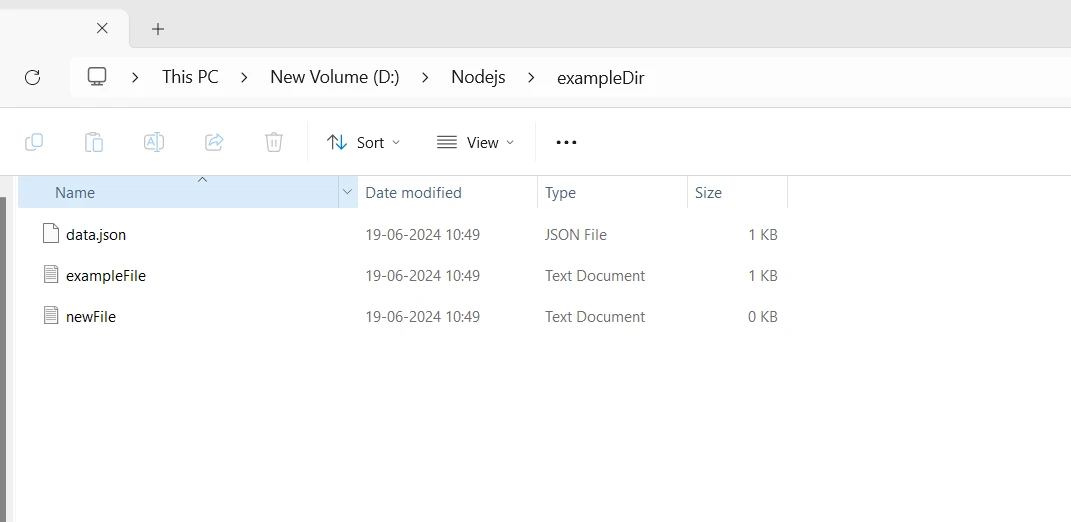
Combining fs-extra with IronPDF
A potent toolkit for Node.js developers is produced by combining IronPDF for reliable PDF production with fs-extra for improved file system operations. This tutorial will show you how to set up a Node.js project using IronPDF and fs-extra and will include sample code that illustrates how to use them together.
What is IronPDF?
IronPDF is a potent Node.js library that seeks to convert HTML data into incredibly high-quality PDF files. It speeds up the process of turning HTML, CSS, and other JavaScript files into properly formatted PDFs without compromising the original web content. This is highly useful for web applications that need to produce dynamic, printable documents such as invoices, certificates, and reports.
IronPDF has several features, including customizable page settings, headers, footers, and options to add fonts and images. It can manage complex styles and layouts to ensure that every test PDF output meets the specifications. Moreover, IronPDF controls JavaScript execution within HTML, allowing for accurate dynamic and interactive content rendering.
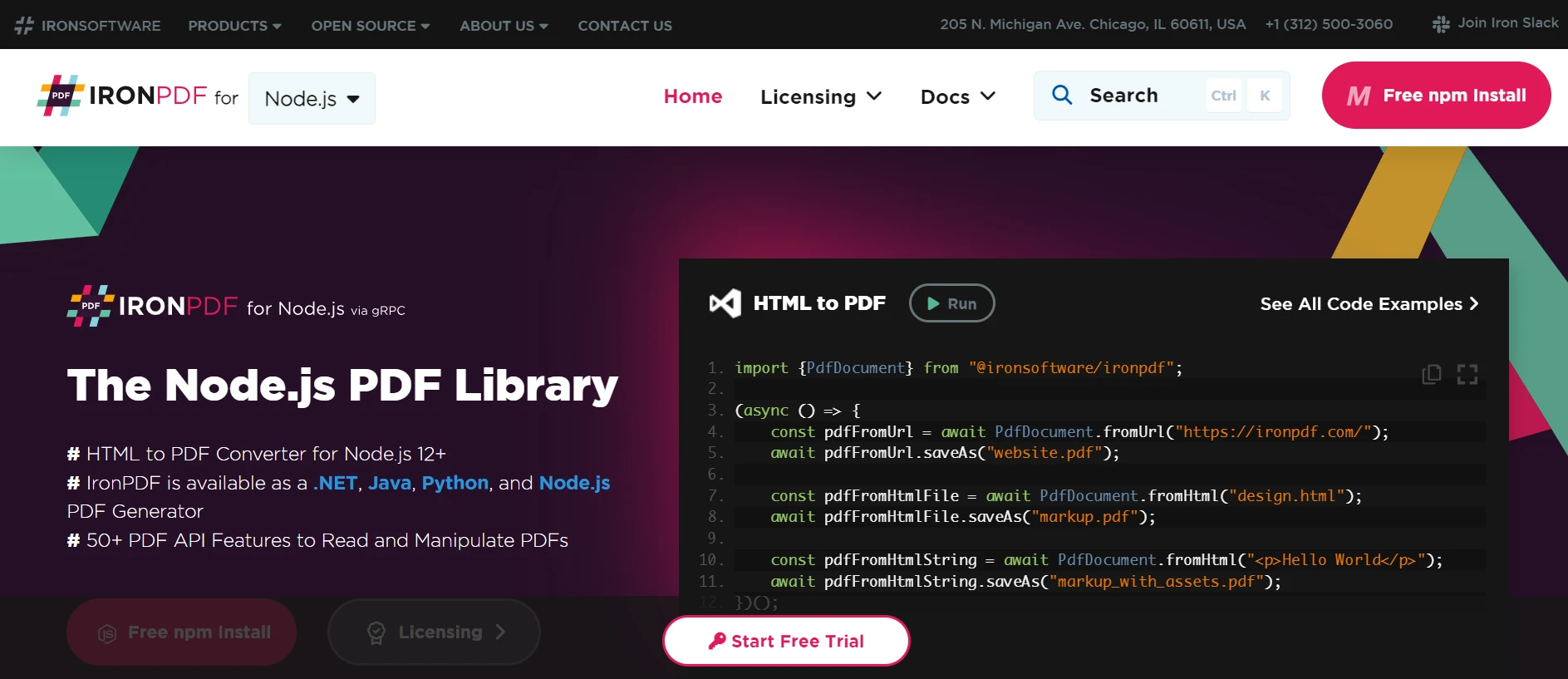
Features of IronPDF
PDF Generation from HTML
Convert HTML, CSS, and JavaScript to PDF. Supports modern web standards like media queries and responsive design, which is handy for using HTML and CSS to dynamically decorate PDF documents, reports, and bills.
PDF Editing
- Add text, images, and other materials to existing PDFs.
- Extract text and images from PDF files.
- Merge several PDFs into a single file.
- Split PDF files into several distinct documents.
- Add headers, footers, annotations, and watermarks.
Performance and Reliability
Design attributes include high performance and reliability in industrial contexts. It easily handles large document sets.
Install IronPDF
To gain the tools you need to work with PDFs in Node.js projects, install the IronPDF package.
npm install @ironsoftware/ironpdfnpm install @ironsoftware/ironpdfIntegrating fs-extra npm with IronPDF
To demonstrate utilizing fs-extra and IronPDF together, open index.js in your preferred text editor and add the following code:
// Import fs-extra and IronPDF libraries
const fs = require('fs-extra');
const IronPdf = require("@ironsoftware/ironpdf");
const document = IronPdf.PdfDocument;
var config = IronPdf.IronPdfGlobalConfig;
config.setConfig({ licenseKey: '' }); // Set your IronPDF license key here
// Asynchronous function to create and manage PDF files
async function createAndManagePDF() {
try {
// Ensure the parent directory exists
const outputDir = 'output';
await fs.ensureDir(outputDir);
// Define the HTML content for the PDF
const htmlContent = `
<html>
<head>
<title>Sample PDF</title>
</head>
<body>
<h1>Hello, world!</h1>
<p>This is a sample PDF generated using IronPDF and fs-extra.</p>
</body>
</html>
`;
// Initialize IronPDF and generate a PDF from the HTML content
let pdf = await document.fromHtml(htmlContent);
const pdfPath = `${outputDir}/sample.pdf`;
await pdf.saveAs(pdfPath);
console.log('PDF generated successfully:', pdfPath);
// Read the PDF file and check its size
const pdfData = await fs.readFile(pdfPath);
console.log('PDF file size:', pdfData.length);
// Copy the PDF file
const copiedPdfPath = `${outputDir}/copied_sample.pdf`;
await fs.copy(pdfPath, copiedPdfPath);
console.log('PDF copied successfully:', copiedPdfPath);
// Move the copied PDF file
const movedPdfPath = `${outputDir}/moved_sample.pdf`;
await fs.move(copiedPdfPath, movedPdfPath);
console.log('PDF moved successfully:', movedPdfPath);
// Remove the original PDF file
await fs.remove(pdfPath);
console.log('Original PDF removed successfully:', pdfPath);
} catch (err) {
console.error('Error during PDF creation and management:', err);
}
}
// Execute the PDF creation and management operations
createAndManagePDF();// Import fs-extra and IronPDF libraries
const fs = require('fs-extra');
const IronPdf = require("@ironsoftware/ironpdf");
const document = IronPdf.PdfDocument;
var config = IronPdf.IronPdfGlobalConfig;
config.setConfig({ licenseKey: '' }); // Set your IronPDF license key here
// Asynchronous function to create and manage PDF files
async function createAndManagePDF() {
try {
// Ensure the parent directory exists
const outputDir = 'output';
await fs.ensureDir(outputDir);
// Define the HTML content for the PDF
const htmlContent = `
<html>
<head>
<title>Sample PDF</title>
</head>
<body>
<h1>Hello, world!</h1>
<p>This is a sample PDF generated using IronPDF and fs-extra.</p>
</body>
</html>
`;
// Initialize IronPDF and generate a PDF from the HTML content
let pdf = await document.fromHtml(htmlContent);
const pdfPath = `${outputDir}/sample.pdf`;
await pdf.saveAs(pdfPath);
console.log('PDF generated successfully:', pdfPath);
// Read the PDF file and check its size
const pdfData = await fs.readFile(pdfPath);
console.log('PDF file size:', pdfData.length);
// Copy the PDF file
const copiedPdfPath = `${outputDir}/copied_sample.pdf`;
await fs.copy(pdfPath, copiedPdfPath);
console.log('PDF copied successfully:', copiedPdfPath);
// Move the copied PDF file
const movedPdfPath = `${outputDir}/moved_sample.pdf`;
await fs.move(copiedPdfPath, movedPdfPath);
console.log('PDF moved successfully:', movedPdfPath);
// Remove the original PDF file
await fs.remove(pdfPath);
console.log('Original PDF removed successfully:', pdfPath);
} catch (err) {
console.error('Error during PDF creation and management:', err);
}
}
// Execute the PDF creation and management operations
createAndManagePDF();The above Node.js code sample combines IronPDF for creating and managing PDF files with fs-extra for advanced file system operations. It starts by ensuring that a directory called "output" exists using the fs.ensureDir() function. A directory is a hierarchical grouping of directories and files. The structure of the PDF that will be created is defined by the HTML content, which is contained in htmlContent. It uses IronPDF's PdfDocument class to insert the HTML content with the fromHtml() method and saves the resulting PDF to "output/sample.pdf" using the saveAs() function.
OUTPUT
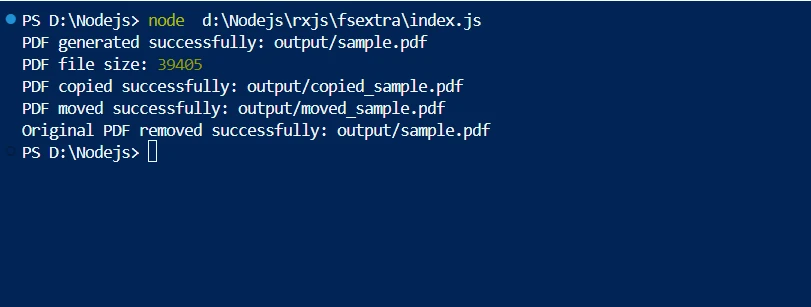
fs-extra is then used to continue file operations: fs.readFile() obtains the PDF's content to track its size. fs.copy() duplicates the generated "output/sample.pdf" to "output/copied_sample.pdf", then the fs.move() method moves this copy to "output/moved_sample.pdf", and finally, removes the original PDF. Error handling via try-catch blocks ensures that any issues arising during the execution of fs methods or activities are properly caught and logged. Overall, this configuration demonstrates how to enhance file operations with fs-extra and how to create and manipulate PDFs with ease in Node.js applications using IronPDF.
OUTPUT PDF
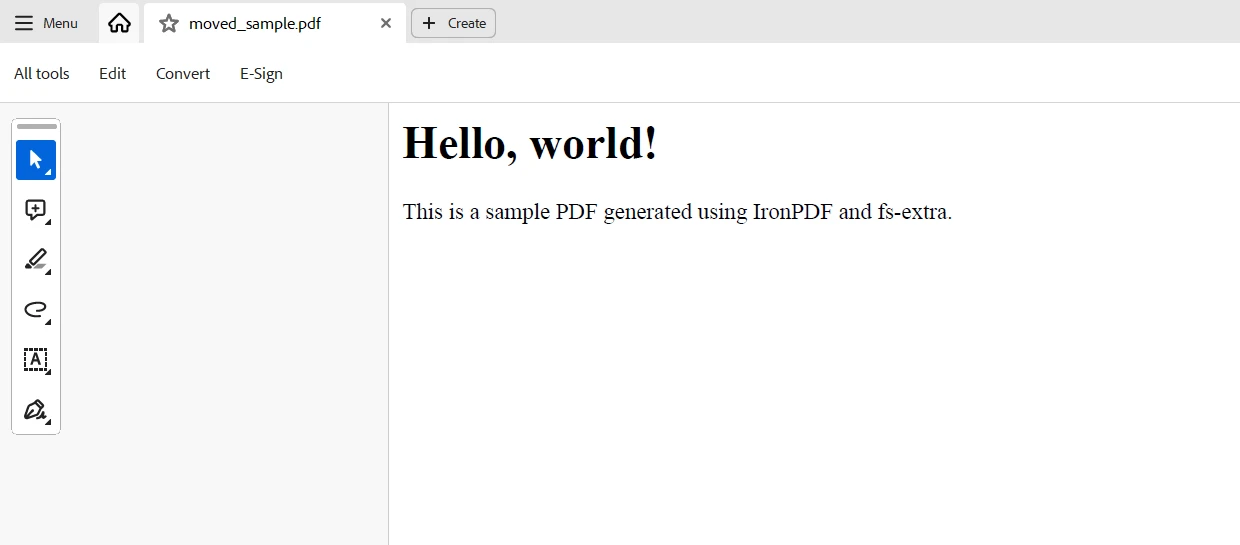
Conclusion
Finally, fs-extra and IronPDF together provide a solid solution for managing file system operations and PDF production in Node.js applications. With its improved methods, fs-extra simplifies tasks like creating directories, copying, moving, and deleting files, and establishes a robust base for efficient file management. Meanwhile, IronPDF offers flexibility in document creation and processing, allowing HTML content to be easily converted into PDF documents.
When combined, these libraries empower developers to easily create dynamic applications capable of creating, managing, and working with PDF files. The integration of fs-extra and IronPDF allows developers to address a variety of document handling needs in Node.js environments with powerful capabilities, whether they are creating invoices, reports, or dynamic documents.
With the help of IronPDF and Iron Software, you can expand your toolkit for node development with OCR, barcode scanning, PDF production, Excel interaction, and a host of other functions. Iron Software provides highly configurable systems and a range of community-supported plugins, enabling developers to create features and web apps more quickly.
IronPDF offers detailed documentation, and licensing options start with plans like $799, making it easy for developers to choose the best model for their project needs. These features enable developers to resolve a variety of problems efficiently and effectively.
Guest: Engage Elephant


